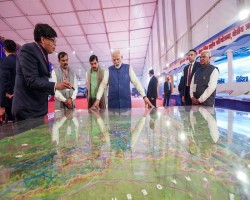SSC Current Affairs
| National |
|---|
|
|
|
Why in the news?
The Ken-Betwa Link Project (KBLP) is a significant initiative under India's National Perspective Plan for interlinking rivers, aiming to address water scarcity and boost agricultural productivity in the Bundelkhand region, spanning parts of Madhya Pradesh and Uttar Pradesh. Project Overview: Objective: To transfer surplus water from the Ken River to the Betwa River, thereby enhancing irrigation, providing drinking water, and generating hydropower. Components: The project involves the construction of the Daudhan Dam and a 2.5-kilometer canal to facilitate water transfer. Financial Outlay: The project is estimated at ₹44,605 crore (approximately $6 billion). Key Benefits: Irrigation: The project aims to irrigate about 1.1 million hectares of land across 10 districts in Madhya Pradesh and Uttar Pradesh, thereby enhancing agricultural productivity. Drinking Water Supply: It is expected to provide drinking water to approximately 6.2 million people in the region. Hydropower Generation: The project includes provisions for generating 103 megawatts of hydropower and 27 megawatts of solar power. Recent Developments: On December 25, 2024, Prime Minister Narendra Modi laid the foundation stone for the Ken-Betwa River Linking National Project in Khajuraho, Madhya Pradesh. During the ceremony, he emphasized the project's potential to transform the water landscape of Bundelkhand, addressing long-standing issues of water scarcity and contributing to the region's socio-economic development. Environmental and Social Considerations: The project has faced scrutiny over potential environmental impacts, particularly concerning the submergence of areas within the Panna Tiger Reserve, which could affect local biodiversity, including tiger habitats and vulture nesting sites. Critics have also raised concerns about the displacement of communities and the project's overall ecological footprint. Conclusion: The Ken-Betwa Link Project represents a significant effort to address water scarcity and promote development in the Bundelkhand region. While it promises substantial benefits in terms of irrigation, drinking water supply, and power generation, it also necessitates careful consideration of environmental and social impacts to ensure sustainable and equitable outcomes. |
|
|
|
About Ken and Betwa Rivers:
The Ken and Betwa Rivers are two important tributaries of the Yamuna River in central India. Both rivers originate in Madhya Pradesh and flow through parts of Uttar Pradesh, playing significant roles in the region's water resources and ecology. Ken River: Origin: The Ken River originates near the village of Ahirgawan in the Katni district of Madhya Pradesh. Course: It flows for about 427 kilometers, primarily through Madhya Pradesh and Uttar Pradesh. It joins the Yamuna River near Chilla village in Uttar Pradesh. Key Features: Panna Tiger Reserve: The river flows through the Panna Tiger Reserve, providing vital water resources to this biodiversity-rich area. Cultural Significance: The Ken River basin has archaeological sites and is culturally significant for communities in the region. Challenges: The Ken River is seasonal, with flow varying drastically between monsoon and dry seasons. Betwa River: Origin: The Betwa River originates in the Vindhya range, near Hoshangabad district in Madhya Pradesh. Course: It flows for about 590 kilometers, passing through Madhya Pradesh and Uttar Pradesh. The river merges with the Yamuna near Hamirpur in Uttar Pradesh. Key Features: Irrigation: The Betwa River supports extensive irrigation in the Bundelkhand region, a drought-prone area. Cultural and Historical Significance: Orchha, a town on the Betwa River, is known for its heritage sites and scenic beauty. Dams and Projects: Major dams like the Rajghat Dam and Matatila Dam have been constructed on the Betwa to support agriculture and water management. Both rivers support agriculture, provide drinking water, and sustain biodiversity in the region. However, seasonal variability and ecological concerns, including the potential impact of developmental projects like the Ken-Betwa Link, highlight the need for sustainable water management. |
| >> More SSC Current Affairs |
